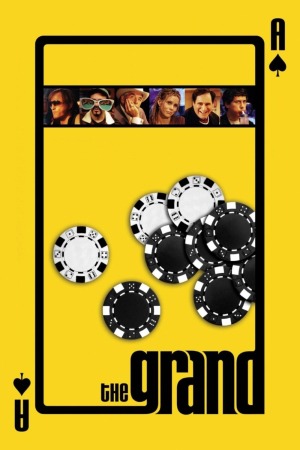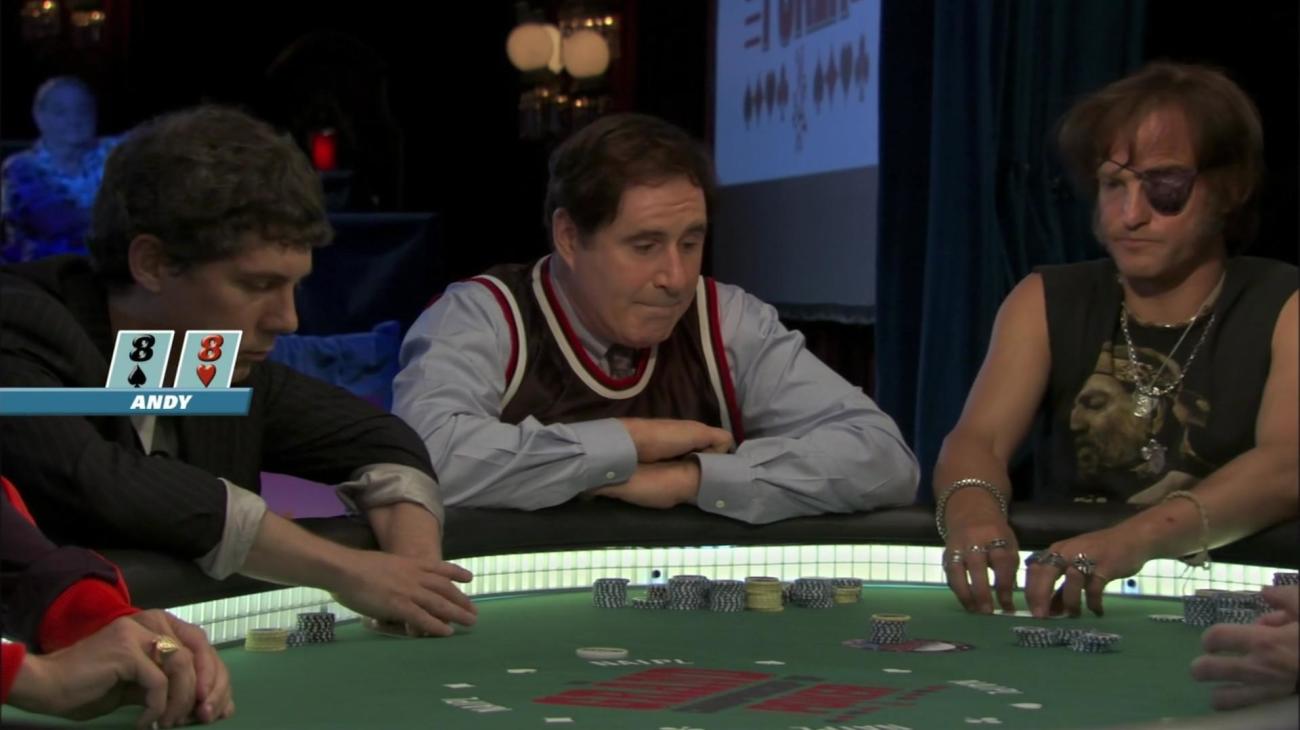
Big money, little movie
It's a bit of a pity that Zak Penn's second feature as a director, The Grand, is getting only the smallest of releases, because it's actually a pretty fun little movie. Probably not good enough to get particularly exercised about its release platform, though. There's nothing under the surface of the comedy, although it's rarely less than amusing and frequently hilarious. As knock-offs go, they can be a hell of a lot worse.
I say "knock-off," because what this is from head to toe is a very self-conscious attempt to imitate the Christopher Guest mockumentary style: a goofy sub-culture is lampooned through a collage of eccentrics, the script was only just a skeleton, and most of the film was created by means of improvisation. The particular sub-culture here is a bit less sub- than dog shows or community theater: this is a comedy about professional poker players and their televised bouts of skill, a topic of some distinct popularity in recent years in the movies. It's a testament to how much everyone involved with The Grand wanted to make a decent movie that it's not just a successful parody of that trend, it's also one of the most satisfying poker films I've seen in an age.
The concept: a $10 million winner-take-all pot is at stake in The Grand, Vegas's oldest poker tournament, and the film focuses on seven players angling for a chance at that lovely prize: "One Eyed" Jack Faro (Woody Harrelson), the drug-addicted heir to one of Sin City's oldest casinos, hoping to win so that he can save his family honor from foreclosure; Lainie (Cheryl Hines) and Larry Schwartzman (David Cross), siblings raised from an early age to appreciation competition above all other forms of human contact; Harold Melvin (Chris Parnell), a sociopathic idiot savant with an encyclopedic love of the film Dune; the crazed Deuce Fairbanks (Dennis Farina), whose only purpose in life is reminiscing about the good old days of Mob-ruled Vegas; Andy Andrews (Richard Kind), an incredibly luck amateur whose knowledge of the game stems from a single online session; and the frightening German (the magnificent Werner Herzog). Other characters hang around the periphery: Lainie's husband Fred Marsh (Ray Romano); the siblings' father Seth (Gabe Kaplan); Harold's abused mother Ruth (Estelle Harris); deranged commentator Mike Werbe (Michael Karnow); addled real estate developer Steve Lavisch (Guest's frequent collaborator Michael McKean). Several notable faces make cameos, but you get the point, I hope: a whole lot of fairly significant actors are involved.
The big question is: can they do improv? And the answer is yes, for the most part. There's not a single performer who rings especially false compared to the rest, although there are definitely bits that work a lot worse than others. The film runs a touch to the long side for a comedy, and it's not very hard to pick ten or fifteen or twenty minutes' worth of rambling asides and jokes without punchlines that could have been cut: maybe not quite so much of Jack Faro's drug history was necessary to get the point across, and given that a couple characters - Harold, Lavisch - really only have one joke, it might have been okay for one or two iterations of those jokes to be cut rather than let things get stale. The entire bit concerning Mike Werbe - likely a problem born at the writing desk, and I certainly don't want to slight the strong work of the non-actor Karnow in this role - feels hopelessly redolent of Fred Willard in Best in Show. But then there are parts that are perfect: anything involving Hines (small wonder, given her prominent position on one of television's great unscripted sitcoms, Curb Your Enthusiasm), Farina's erratic one-liners about the great old days of teenage whores and wanton violence on the strip, or the mesmerising sight of Herzog trading on our idea of what "Herzog" is, playing an erudite monster who strangles small animals to death in the morning because he thinks coffee is for poseurs. This is the second of Penn's two films to make good use of the presence of the famously intense German director, but while Incident at Loch Ness works only because of the mobius-logic of Herzog playing Herzog making a Herzog movie (which is not to say that it doesn't work), The Grand simply reaches its peak when Herzog is onscreen - it would still be a successful film without him, he just adds a delightful flavor to the proceedings.
I can't help feeling that "it's almost always funny" isn't really that big of a deal, though. True, we live in an age when the great bulk of comedies almost always aren't funny, but unlike the best of Guest's work - Mitch & Mickey in A Mighty Wind, almost everything in Waiting for Guffman - there's no "there" there. It's funny, then it stops, and it doesn't really leave the theater with you. It's the paradox of The Grand's success: it's good enough that I'm a little bit angry that it wasn't even better.
7/10
I say "knock-off," because what this is from head to toe is a very self-conscious attempt to imitate the Christopher Guest mockumentary style: a goofy sub-culture is lampooned through a collage of eccentrics, the script was only just a skeleton, and most of the film was created by means of improvisation. The particular sub-culture here is a bit less sub- than dog shows or community theater: this is a comedy about professional poker players and their televised bouts of skill, a topic of some distinct popularity in recent years in the movies. It's a testament to how much everyone involved with The Grand wanted to make a decent movie that it's not just a successful parody of that trend, it's also one of the most satisfying poker films I've seen in an age.
The concept: a $10 million winner-take-all pot is at stake in The Grand, Vegas's oldest poker tournament, and the film focuses on seven players angling for a chance at that lovely prize: "One Eyed" Jack Faro (Woody Harrelson), the drug-addicted heir to one of Sin City's oldest casinos, hoping to win so that he can save his family honor from foreclosure; Lainie (Cheryl Hines) and Larry Schwartzman (David Cross), siblings raised from an early age to appreciation competition above all other forms of human contact; Harold Melvin (Chris Parnell), a sociopathic idiot savant with an encyclopedic love of the film Dune; the crazed Deuce Fairbanks (Dennis Farina), whose only purpose in life is reminiscing about the good old days of Mob-ruled Vegas; Andy Andrews (Richard Kind), an incredibly luck amateur whose knowledge of the game stems from a single online session; and the frightening German (the magnificent Werner Herzog). Other characters hang around the periphery: Lainie's husband Fred Marsh (Ray Romano); the siblings' father Seth (Gabe Kaplan); Harold's abused mother Ruth (Estelle Harris); deranged commentator Mike Werbe (Michael Karnow); addled real estate developer Steve Lavisch (Guest's frequent collaborator Michael McKean). Several notable faces make cameos, but you get the point, I hope: a whole lot of fairly significant actors are involved.
The big question is: can they do improv? And the answer is yes, for the most part. There's not a single performer who rings especially false compared to the rest, although there are definitely bits that work a lot worse than others. The film runs a touch to the long side for a comedy, and it's not very hard to pick ten or fifteen or twenty minutes' worth of rambling asides and jokes without punchlines that could have been cut: maybe not quite so much of Jack Faro's drug history was necessary to get the point across, and given that a couple characters - Harold, Lavisch - really only have one joke, it might have been okay for one or two iterations of those jokes to be cut rather than let things get stale. The entire bit concerning Mike Werbe - likely a problem born at the writing desk, and I certainly don't want to slight the strong work of the non-actor Karnow in this role - feels hopelessly redolent of Fred Willard in Best in Show. But then there are parts that are perfect: anything involving Hines (small wonder, given her prominent position on one of television's great unscripted sitcoms, Curb Your Enthusiasm), Farina's erratic one-liners about the great old days of teenage whores and wanton violence on the strip, or the mesmerising sight of Herzog trading on our idea of what "Herzog" is, playing an erudite monster who strangles small animals to death in the morning because he thinks coffee is for poseurs. This is the second of Penn's two films to make good use of the presence of the famously intense German director, but while Incident at Loch Ness works only because of the mobius-logic of Herzog playing Herzog making a Herzog movie (which is not to say that it doesn't work), The Grand simply reaches its peak when Herzog is onscreen - it would still be a successful film without him, he just adds a delightful flavor to the proceedings.
I can't help feeling that "it's almost always funny" isn't really that big of a deal, though. True, we live in an age when the great bulk of comedies almost always aren't funny, but unlike the best of Guest's work - Mitch & Mickey in A Mighty Wind, almost everything in Waiting for Guffman - there's no "there" there. It's funny, then it stops, and it doesn't really leave the theater with you. It's the paradox of The Grand's success: it's good enough that I'm a little bit angry that it wasn't even better.
7/10
Categories: big ol' ensemble films, comedies, viva las vegas






